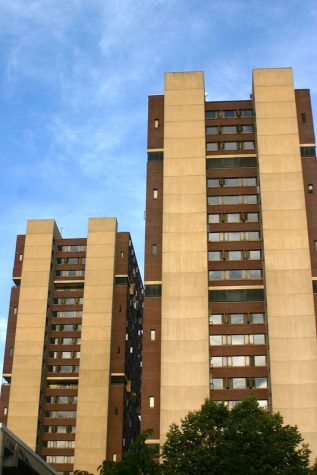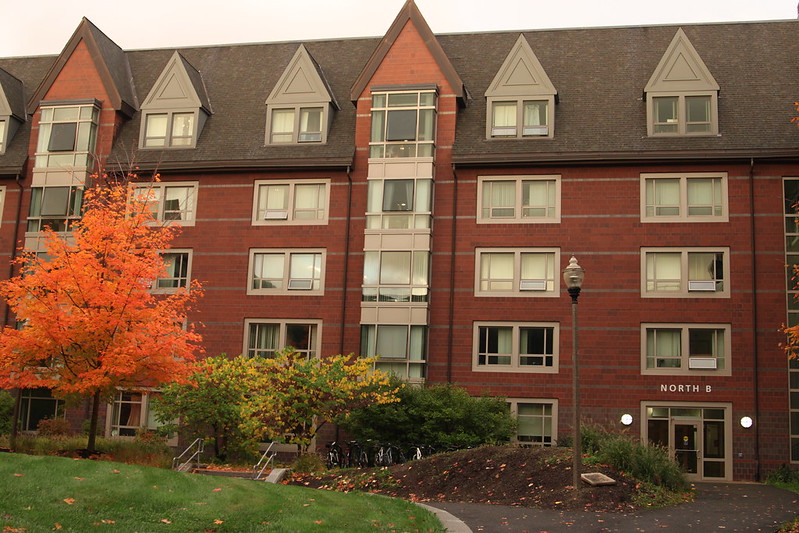Christina Yacono/Daily Collegian
Graduate students moved from Southwest apartments with 24-hour notice to make space for quarantine housing
“I'd really like to go home”
February 17, 2021
Around 2 p.m. on Saturday, Feb. 6, a graduate student living with their family in an apartment in Southwest Residential Area received a phone call from an administrator in Residential Life. Their building was being turned into quarantine space and they had 24 hours to relocate to North Apartments.
The graduate student mentioned throughout this story is employed by Student Affairs and lives with their family in an apartment in one of the Southwest towers. Some details in this story, including the student and their family’s name and exact residence will be kept anonymous in order to avoid retribution against them.
“It was very traumatic,” the family said. “The place that we thought was the safest is no longer safe for us.”
The graduate student’s partner was working when Residential Life called and was therefore unable to assist in packing until they arrived home.
“The first sort of emotions that spring to mind were disbelief that it was happening,” their partner said. “Then that slowly turned to heartbreak and anger.”
The family has five members who live either full-time or part time with them. The majority of the family, which includes a young child and an older individual, are at an increased risk of COVID-19 either due to age or health conditions.
All told, the family had about 18 hours to pack up their belongings and move. Factoring in work and sleep, it was even less.
“It was extremely stressful because we were given only a couple boxes and one bin; one bin for a whole household,” the student said. “We were told, ‘you have to bring your stuff to the lobby and meet with the movers at 10 a.m. If not, you’re on your own.’”
Their kitchen appliances alone took up all the space in the boxes UMass provided. “You have to think about pots, pans, cooking items, oil, spices, food, etc.” the family said. “We ended up having to resort to whatever duffel bags and trash bags we had to put our clothing and the little one’s toys and the elder’s medication.”
They also needed to pack all of their own office supplies, as well as schoolwork for the child they care for.
While packing, the family said they were only focusing on essential items. They ended up forgetting about toilet paper, cleaning equipment and other items required for day-to-day living.
The University of Massachusetts confirmed that five Residential Life staff, including some with families, were temporarily moved out of John Adams and Washington to create more quarantine and isolation space as COVID-19 cases spiked during the first weeks of the semester.
“They were instructed to take only what they needed for a couple of weeks, and arrangements are being made for them to enter John Adams or Washington if they forgot items that they need,” said Mary Dettloff, a campus spokesperson.
“This was not an eviction. It is an effort to ensure the university can fully support our students who need quarantine and isolation space,” Dettloff said.
The five graduate students, including some with families, were relocated to the North Apartments, where they are currently residing for at least two weeks. Depending on the outbreak, their stay there may be extended.
While the University gave them an option to stay in their Southwest apartments, the family did not feel as though they had a choice.
“This is a matter of life or death for us. We have too many people who are high risk in our household to even consider staying in a building that’s going to be filled with people who are positive for COVID,” the family said.
The University financially compensated the graduate students for their time spent moving but the family did not find it to be enough.
“It feels as if because they gave us a couple boxes, and a bin and a [little] change for the time to take us to move that it justifies and makes up the emotional mental trauma it has put our family through,” the family said. “There’s no compensation for trauma.”
They added that they have not yet received the compensation and that the money will not “account for things we had to go out to purchase since we did not have time to pack everything we needed.” The family had to buy additional bedding because they were moved from a queen sized to twin sized bed. Their partner also lost working wages because they had to take time off to help with the move.
In addition to the expense, the move took up time of a busy family in a middle of a semester. The student in the family is a Ph.D. candidate and mentioned how strict deadlines for fellowships, conferences and presentations are not accommodated by things like this.
“You can’t make up time,” the student said.
“The trauma of being forced to move so suddenly, in the middle of a pandemic, especially with a whole family is completely unfair,” said Sonya Epstein, the Student Government Association president. They added that the Dean of Students Office did not reach out to the graduate students right away, “so they were kind of left hanging without support.”
“They were essentially given no option and then moved into a space that didn’t even really fit the needs of their family,” said Sara McKenna, the secretary of university policy for the SGA.
“We went from an actual apartment that is accommodating for families, to an apartment where we all are living on single, twin size beds,” the family said. These beds are not supportive enough for the older family member and too small for the couple to sleep together.
McKenna said the apartment in Southwest is built for a family. “It’s not just like getting moved from one dorm room to another. It’s a much bigger impact than that.”
The family also said the heat was not working in the North Apartments.
“We confirmed with the other two other grads — they’re also freezing and we’re in the middle of winter. We all have to wear our winter jackets in our apartment.” They tried adjusting the thermostat with no results.
McKenna added that the space has “inadequate network connections,” which she said is especially troublesome given the multiple family members working and taking classes online.
“You’re essentially not able to complete that work,” McKenna said.
“Residential Life is working with the staff to provide access to office space, internet service and cable television. Facilities is also working on the heating issue that some are experiencing,” the University said.
—
Additionally, the family was never told that their Southwest building could be turned into quarantine housing for undergraduates.
“The Public Health Promotion Center wanted to have these spaces ready to go in case our present quarantine and isolation spaces, currently about 50 percent full, completely fill,” Dettloff said. “Having spaces in Southwest will make it easier for the PHPC to move students in Southwest who need to be isolated or quarantined.”
Dawn Bond, who works for residential life student services, told Epstein that Lincoln Hall, Brown Hall and McNamara Hall would be used for isolation and quarantine space. John Adams Hall and Washington Hall were never designated.
However, Epstein noted that if John Adams Hall and Washington Hall were made available when the University still had 50 percent capacity of on-campus quarantine space, then it was planned to be used quarantine housing.
“It just feels like this decision was made beforehand and they were notified super, super late, which is completely unfair,” McKenna said. “If that planning and notification had been in place, then potentially, they could have arranged to live in a different space for the entirety of the year or at least this semester, so that they wouldn’t have to move.”
According to the family, other graduate students and staff moved out of their apartments because they were told that the space will be used as quarantine spaces once school opened.
McKenna said there were multiple planning groups that met last fall to outline and solidify a plan for the spring semester. The secretary of university policy said that in these meetings, she raised the question of what would happen if UMass “runs out of quarantine space.”
In response, the University said there were additional halls they could bring online, though never noting which ones, McKenna said.
“When they said that they were offline and could be brought online, I took that to mean that nobody was living in them — that the lights were off, the heat was off, everything was closed, locked up,” she said. “If I had known that they were offline, but there were still people living them, I would have probably thought to ask that question.”
“We are deeply disturbed by University Leadership’s decision to displace these students and their families in the midst of a global pandemic,” said the Graduate Student Senate Leadership in a statement to the Daily Collegian on Feb. 8.
GSS, SGA leadership and Student Trustee Timothy Scalona reached out to Chancellor Kumble Subbaswamy, the statement said, “to protest this action, and to ensure all available resources are being employed by the University to assist these graduate students and their families in transitioning to alternative housing.”
“We are particularly interested in finding out why the University was not better prepared for the eventualities necessitating additional quarantine and isolation space, and why the stability of graduate student families did not factor into the University’s plan for dealing with a COVID outbreak of this size,” the statement said.

UMass said that, “While this was inconvenient for the staff who were moved, it was necessary to have quarantine and isolation space ready should our COVID case numbers continue to increase.”
The family said they feel “discarded.” They made it clear they are not angry with people “at the bottom” executing the decisions, they are angry with administrators.
“They were okay with us being collateral damage — fixing a public health crisis that could have been averted with more proactive policymaking,” they said. “I feel personally like we’re the scapegoats for terrible decision making up high with the University.”
The family also compared their relocation to graduate student families who were moved from North Village. “It seems as if when it comes to considering the needs of graduate students and graduate students with families, the University is not forgiving and is actually very callous.”
“The lack of recognition of the impact is extremely upsetting to all of us, because though it’s five households, and that may seem insignificant to some compared to the other thousands of students that live on campus, that’s still five families that you forced to uproot, and pack for two weeks, in such a short amount of time,” McKenna said. “And they don’t know when they’re going to be able to re-enter their home.”
“I don’t like living here and I really like the home that we built,” the family said. “I’d really like to go home.”
Cassie McGrath can be reached at [email protected]. Follow her on Twitter @cassiemcgrath_.





